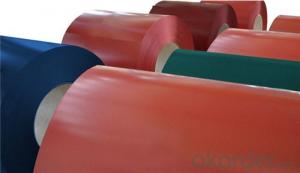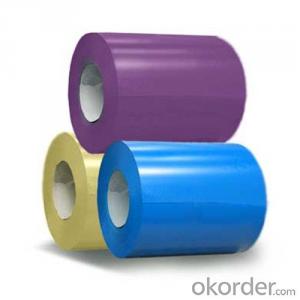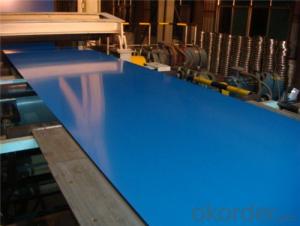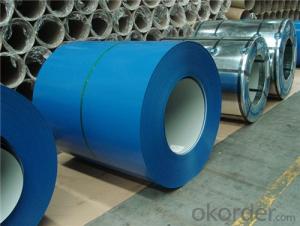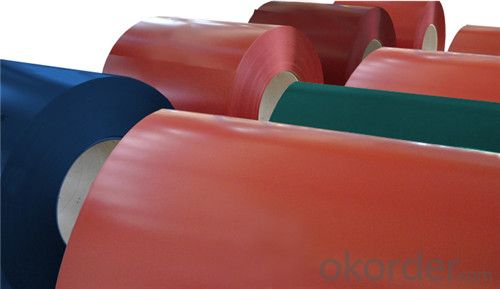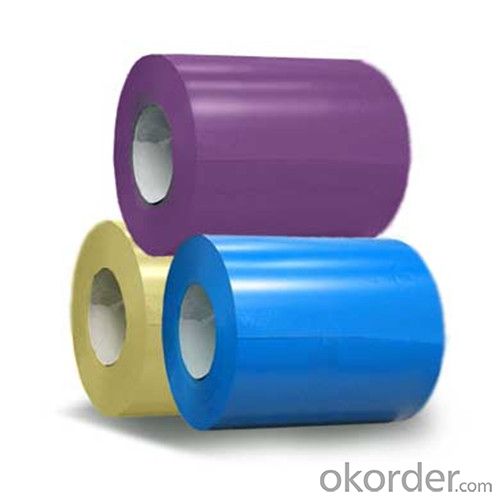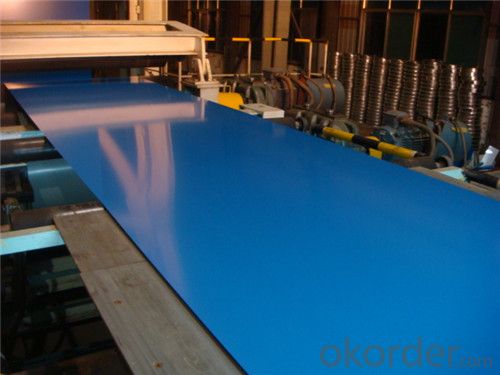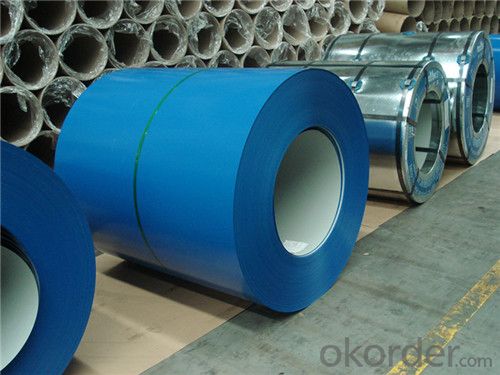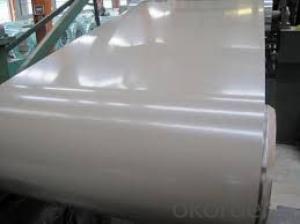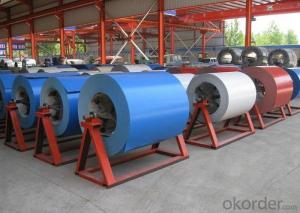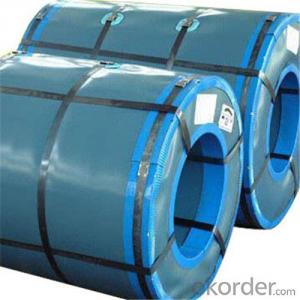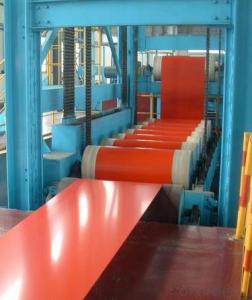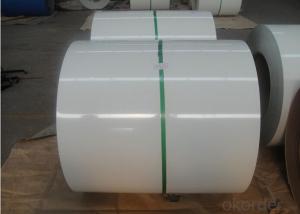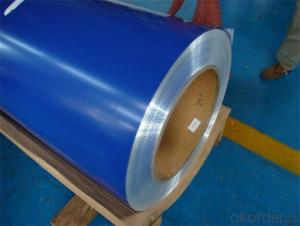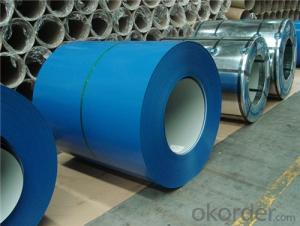Prepainted rolled Steel Coil for Construction Roofing constrution
- Loading Port:
- Shanghai
- Payment Terms:
- TT OR LC
- Min Order Qty:
- 50 m.t.
- Supply Capability:
- 30000 m.t./month
OKorder Service Pledge
OKorder Financial Service
You Might Also Like
Structure of Prepainted Rolled steel Coil for Construction Roofing
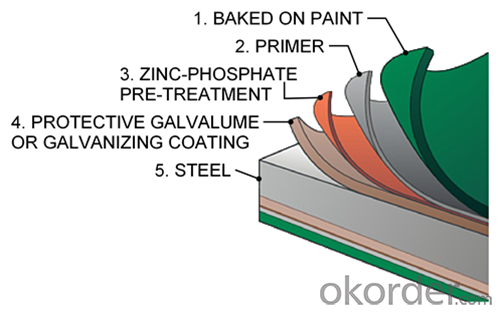
Description of Prepainted Rolled steel Coil for Construction Roofing
Prepainted Rolled steel Coil is a kind of coated steel coil/sheet. With the cold rolled steel of different strength and thickness as substrate, it is produced through applying Al-Zn coat on both faces by hot dip process. In its coating, Al accounts for about 55%, Si 1.6%, while the remaining is Zn. Aluminum zinc coils enjoys both the physical protective feature and durability of Al and the electrochemical protective property of Zn. And its surface has bright silver color and regular embossed-like figure, which are highly decorative.
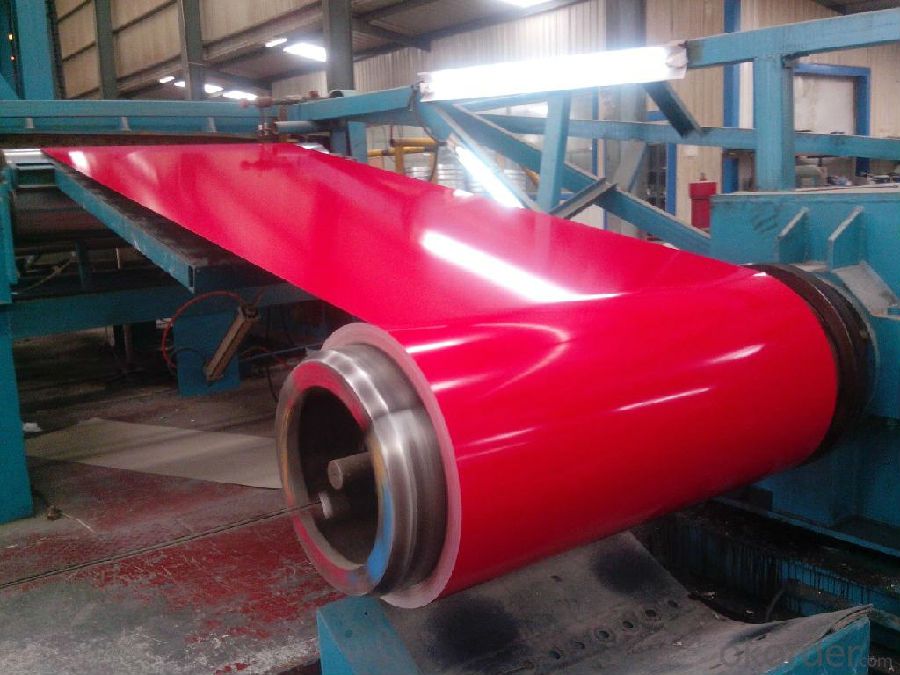
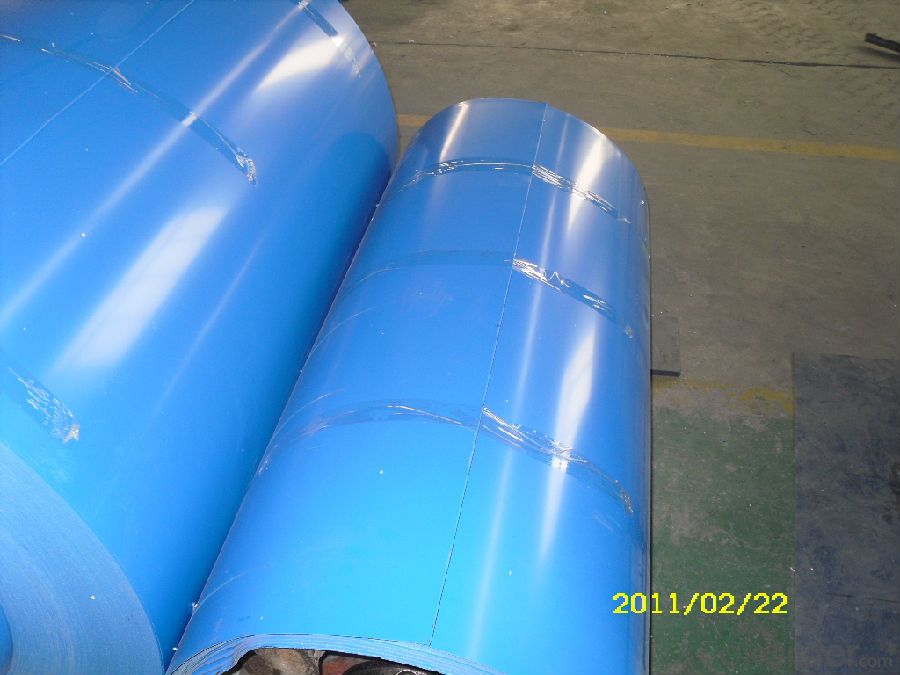
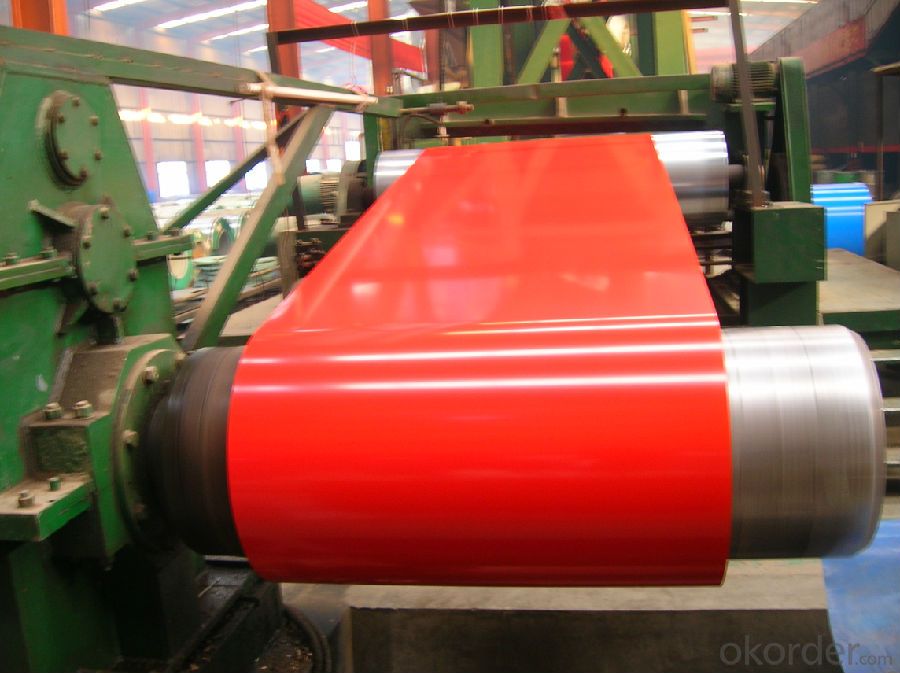
Main Feature of Prepainted Rolled steel Coil for Construction Roofing
1.Corrosion resistance: It mainly depends on the aluminum protection. When the zinc being worn, the aluminum will form a dense layer of aluminum oxide, resist corrosion material to prevent further corrosion inside.
2. Heat resistance: Aluminum zinc alloy steel sheet has excellent heat resistance, can withstand high temperatures over 300 centigrade, and is similar with aluminized steel high temperature oxidation resistance. It often used in chimney pipes, ovens, fluorescent lighting device and the device cover.
3. Heat reflective: Galvanized steel plate heat-reflective high rate is twice as galvanized steel, often used to make insulation materials.
4. Economy: Because density of 55% AL-Zn is smaller than the density of Zn, so in the same weight and thickness of Galvanized zinc layer, aluminum-zinc steel plate is larger area more than 3% of galvanized steel sheet.
Applications of Prepainted Rolled steel Coil for Construction Roofing
1. Construction and building: roofing; ventilating duct; handrail; partition panel;etc.
2. Electric appliance: refrigerator; washing machine; refrigerator; DVD;etc.
3.Transportation: oil tank; road sign; etc.
4.Agriculture:barn; etc.
5.Others:vending machine; game machine; etc.
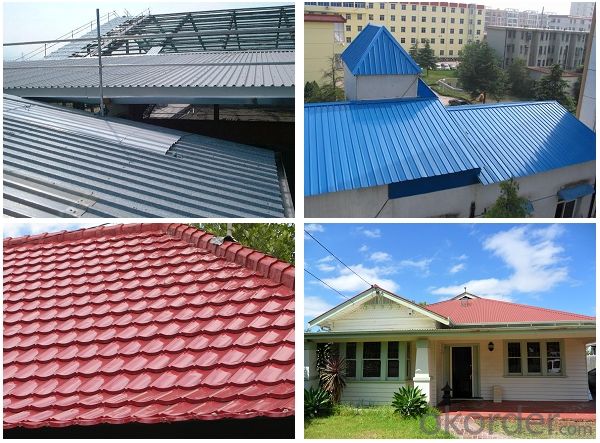
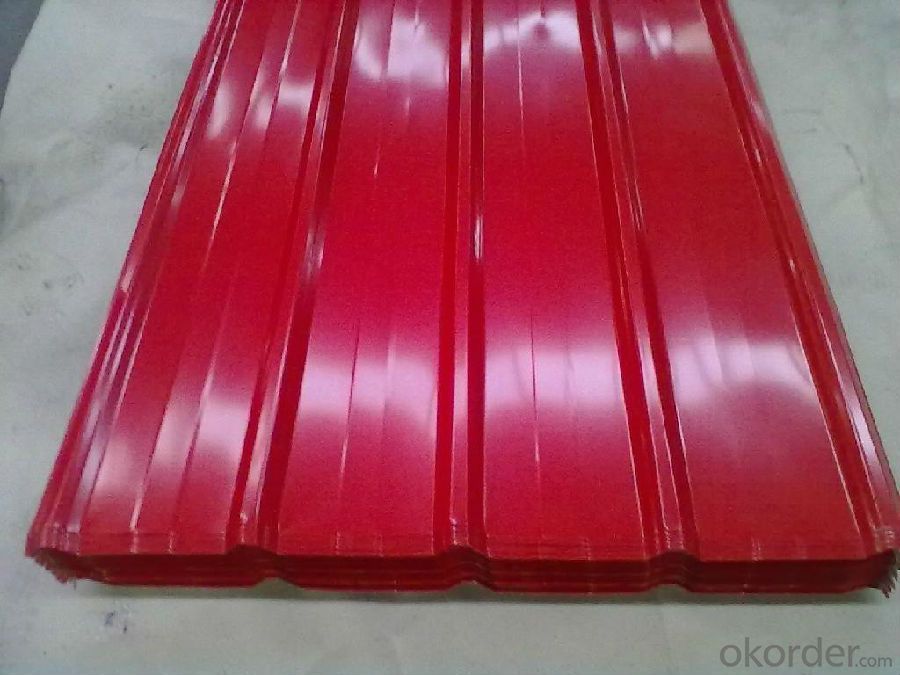
Specifications of Rolled steel Coil for Construction Roofing
Product | Prepainted Rolled steel Coil for Construction Roofing |
Material Grade | SGCC / SGCH / DX51D+AZ, etc |
Thickness | 0.2-3.0mm |
Width | 600-1500mm |
Tolerance | Thickness: +/-0.02mm , Width:+/-2mm |
Zinc-coating | AZ40-150g/m2 |
Technique | Raw material: Hot rolled steel coil --> Cold rolled_>hot dipped galvalume |
Surface | Dried, Chromated, Unoiled |
Spangle | Regular spangle , small spangle, zero spangle |
ID | 508MM |
Coil weight | 10MT max |
Export package | Cardboard inner sleeves, Waterproof paper, galvanized steel covered and steel strip packed |
FAQ of Prepainted Rolled steel Coil for Construction Roofing
We have organized several common questions for our clients,may help you sincerely:
1. What is the minimum order quantity ?
Our MOQ is 50mt for each size. And we will consider to give more discount if you make big order like 1000 tons and more. Further more, the more appropriate payment term your offer the better price we can provide.
2. How long can we receive the product after purchase?
Usually within thirty working days after receiving buyer’s advance payment or LC. We will arrange the factory manufacturing as soon as possible. The cargo readiness usually takes 15-25 days, but the shipment will depend on the vessel situation.
3. How to guarantee the quality of the products?
We have established the international advanced quality management system,every link from raw material to final product we have strict quality test;We resolutely put an end to unqualified products flowing into the market. At the same time, we will provide necessary follow-up service assurance.
- Q: How are steel coils loaded onto a truck?
- Loading steel coils onto a truck is typically accomplished by combining machinery and manual labor. To ensure safe and efficient loading, several steps are involved. To begin, the truck must be adequately prepared. This entails cleaning the truck's bed and removing any debris or obstacles that could hinder the loading process. Additionally, protective materials like rubber mats may be placed on the truck's bed to safeguard both the coils and the truck. Next, a forklift or crane is utilized to lift and position the steel coils onto the truck. The operator must handle the coils with care, ensuring they are balanced and securely fastened to prevent movement during transportation. Adhering to proper lifting techniques and safety protocols is critical to avoid accidents or coil damage. After the coils are positioned on the truck, various methods can be employed to secure them. This may involve using straps, chains, or other restraints to hold the coils in place and prevent shifting or falling while in transit. The restraints must be appropriately tightened and inspected to withstand the weight and movement of the coils. It is worth noting that the loading process may vary based on the size and weight of the steel coils, as well as the available equipment. Some trucks may feature specialized loading systems specifically designed for steel coils, streamlining the process and enhancing safety. In summary, loading steel coils onto a truck necessitates meticulous planning, skilled operators, and suitable equipment. Adhering to proper procedures and safety measures is vital to ensure successful coil transportation and prevent accidents or damage.
- Q: How are steel coils used in the production of roofing and siding?
- Steel coils are an essential component in the production of roofing and siding materials. These coils, made from high-quality steel, undergo various processes to transform them into the final products used for roofing and siding purposes. Firstly, the steel coils are uncoiled and flattened to obtain a flat sheet of steel. This sheet is then cleaned to remove any impurities or contaminants. The cleaning process involves treating the surface of the steel with chemicals and rinsing it thoroughly to ensure a clean and smooth surface. Next, the steel sheet is coated with a protective layer to enhance its durability and resistance to corrosion. This coating can be done through various methods such as hot-dip galvanizing, electro-galvanizing, or applying a layer of metallic or organic coating. The specific coating method depends on the desired properties and aesthetic requirements of the roofing or siding material. After the coating process, the steel sheet is formed into the desired shape and profile. For roofing applications, the steel sheet is typically corrugated or formed into interlocking panels. This allows for easy installation and ensures a secure and weatherproof roofing system. Similarly, for siding applications, the steel sheet can be formed into different profiles such as horizontal or vertical panels, shingles, or shakes. Once the steel sheet is formed, it may undergo additional treatments to enhance its performance. This can include applying a protective layer of paint or other finishes to improve its appearance and resistance to fading, chipping, or scratching. The steel coils can also be embossed or stamped with patterns or textures to provide aesthetic appeal. Overall, steel coils play a crucial role in the production of roofing and siding materials. They provide strength, durability, and weather resistance, making them an ideal choice for protecting buildings from the elements. Additionally, steel coils offer versatility in terms of shape, profile, and finish, allowing for a wide range of design options for roofing and siding applications.
- Q: How do steel coils contribute to the agricultural machinery industry?
- Steel coils are an essential component in the agricultural machinery industry due to their versatile and durable nature. They are used in various applications and play a crucial role in improving the efficiency and productivity of agricultural machinery. One of the primary ways steel coils contribute to the agricultural machinery industry is through their use in the manufacturing of equipment frames and structures. These frames provide the necessary strength and stability to withstand the demanding conditions of agricultural operations. Whether it is in tractors, harvesters, or tillers, steel coils are used to create sturdy and rigid frames that can handle heavy loads, vibrations, and impacts. Additionally, steel coils are used in the fabrication of components such as plow blades, cultivator tines, and seed drills. These components are crucial for soil preparation, seed planting, and crop maintenance. Steel coils provide the necessary strength and resistance to wear and tear, ensuring these components can withstand the rigors of agricultural operations and last for extended periods. Furthermore, steel coils are also used in the manufacturing of hydraulic systems and other moving parts in agricultural machinery. These systems are responsible for powering and controlling various functions, such as lifting, lowering, and steering. Steel coils provide the necessary strength and flexibility for these systems to function optimally, ensuring smooth and efficient operation of agricultural machinery. Moreover, steel coils contribute to the agricultural machinery industry by enhancing the safety and longevity of the equipment. Steel is known for its excellent resistance to corrosion, rust, and extreme weather conditions. By using steel coils in the construction of agricultural machinery, manufacturers can ensure that the equipment remains durable and reliable even in harsh environments, ultimately reducing maintenance costs and improving the overall lifespan of the machinery. In conclusion, steel coils are an indispensable component in the agricultural machinery industry. Their versatility, strength, and durability make them crucial for the manufacturing of equipment frames, components, hydraulic systems, and other moving parts. By utilizing steel coils, the agricultural machinery industry can produce robust and efficient equipment that can withstand demanding agricultural operations, improve productivity, enhance safety, and extend the lifespan of the machinery.
- Q: How are steel coils loaded and unloaded from ships?
- Steel coils are typically loaded and unloaded from ships using cranes or heavy machinery. The coils are lifted onto the ship using hooks or clamps, and secured in place to prevent movement during transportation. Once the ship reaches its destination, the coils are then carefully lifted off the ship and transferred to trucks or other modes of transportation for further distribution.
- Q: What are the common coil thickness tolerances?
- The common coil thickness tolerances can vary depending on the specific industry and application. However, typical tolerances for coil thickness range from +/- 0.001 inches to +/- 0.005 inches.
- Q: How much should someone sell a 6 ft stainless steel counter? How about one with a sink?
- Ask for the best offer on OKorder and find out.
- Q: Can steel coils be used in the production of construction machinery?
- Yes, steel coils can be used in the production of construction machinery. Steel coils are often used as raw materials for manufacturing various components of construction machinery such as frames, chassis, gears, and structural parts. The high strength and durability of steel make it an ideal material for construction machinery, which often requires heavy-duty performance in tough working conditions. Additionally, steel coils can be easily shaped, welded, and fabricated into the desired forms and sizes, allowing for customization and versatility in the production of construction machinery.
- Q: What is the maximum temperature steel coils can withstand?
- The maximum temperature that steel coils can withstand varies depending on the specific grade and type of steel being used. Steel is known for its high heat resistance and can typically withstand temperatures ranging from 550°C to 1,100°C (1,022°F to 2,012°F), depending on the grade. However, it is important to note that prolonged exposure to high temperatures can cause steel to lose its structural integrity and result in permanent deformation or even failure. Therefore, it is crucial to adhere to the manufacturer's guidelines and specifications when determining the maximum temperature that steel coils can withstand in specific applications.
- Q: Can steel coils be stretched?
- No, steel coils cannot be stretched as steel is a rigid material and does not have the ability to be stretched like other elastic materials.
- Q: How are steel coils used in the production of consumer goods?
- Steel coils are used in the production of consumer goods by being processed and shaped into various components, such as springs, wires, or tubes, which are then used in the manufacturing of products like automobiles, appliances, furniture, and packaging materials.
Send your message to us
Prepainted rolled Steel Coil for Construction Roofing constrution
- Loading Port:
- Shanghai
- Payment Terms:
- TT OR LC
- Min Order Qty:
- 50 m.t.
- Supply Capability:
- 30000 m.t./month
OKorder Service Pledge
OKorder Financial Service
Similar products
Hot products
Hot Searches
Related keywords
